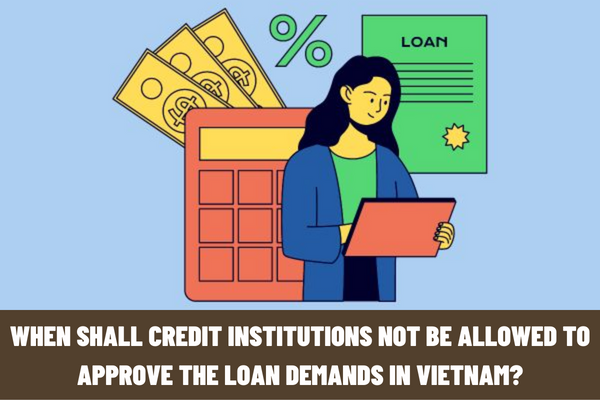When shall credit institutions not be allowed to approve the loan demands in Vietnam? What are the eligibility requirements for a bank loan?
When shall credit institutions not be allowed to approve the loan demands in Vietnam?
Pursuant to Article 8 of Circular No. 39/2016/TT-NHNN (some contents are corrected in Clauses 1, 2 and 3, Article 1 of Decision No. 312/QD-NHNN in 2017) stipulating rejected loan demands as follows:
Rejected loan demands
Credit institutions shall not be allowed to approve the following loan demands:
1. Loans used for investing in sectors or activities prohibited by laws.
2. Loan used for paying expenses or meeting financial demands of transactions or acts which are prohibited by laws.
3. Loans used for purchasing or using goods or services in the list of sectors or activities prohibited by laws.
4. Loans used for buying gold bullions.
5. Loans used for repayments of loans to financial institutions owed to lending credit institutions, except for those used for paying loan interest arising during the construction process of which cost is accounted for in the total investment approved by a regulatory authority in accordance with laws.
6. Loans used for repayments of loans to financial institutions owed to other credit institutions and foreign loan debts, except for loans used for repaying debts prior to the payment due date that fully meet the following requirements:
a) Be a loan used for business activities;
b) Have the loan term that does not exceed the residual loan term of an older loan;
c) Be a loan under which the debt rescheduling has not been carried out.
Thus, credit institutions shall not be allowed to approve the following loan demands:
- Loans used for investing in sectors or activities prohibited by laws.
- Loan used for paying expenses or meeting financial demands of transactions or acts which are prohibited by laws.
- Loans used for purchasing or using goods or services in the list of sectors or activities prohibited by laws.
- Loans used for buying gold bullions.
- Loans used for repayments of loans to financial institutions owed to lending credit institutions, except for those used for paying loan interest arising during the construction process of which cost is accounted for in the total investment approved by a regulatory authority in accordance with laws.
- Loans used for repayments of loans to financial institutions owed to other credit institutions and foreign loan debts, except for loans used for repaying debts prior to the payment due date that fully meet the following requirements:
+ Be a loan used for business activities;
+ Have the loan term that does not exceed the residual loan term of an older loan;
+ Be a loan under which the debt rescheduling has not been carried out.

When shall credit institutions not be allowed to approve the loan demands in Vietnam? What are the eligibility requirements for a bank loan?
What are the eligibility requirements for a bank loan?
Pursuant to Article 7 of Circular No. 39/2016/TT-NHNN stipulating as follows:
Eligibility requirements for a loan
A credit institution shall consider granting a decision to offer a loan to a customer who meets the following requirements:
1. If that customer is a legal person, it must have civil capacity in accordance with the civil law jurisdictions. If that customer is a natural person, (s)he must be aged exactly 18 years or older and have full capacity for civil conduct in accordance with the civil law jurisdictions, or must be aged between exactly 15 and nearly 18 years and must not have his/her incapacity or restricted capacity for civil conduct as provided by laws.
2. Demonstrate that customer’s demands for a loan to be used for legally accepted purposes.
3. Establish that customer’s plan for effective use of borrowed fund.
4. Prove the customer’s sound financial capability to repay debt owed.
5. Where that customer obtains a loan from a credit institution on which the interest rate is prescribed by Clause 2 Article 13 hereof, it shall be rated transparent and healthy in its financial status by a credit institution.
Thus, a credit institution shall consider granting a decision to offer a loan to a customer who meets the following requirements:
(1) If that customer is a legal person, it must have civil capacity in accordance with the civil law jurisdictions.
If that customer is a natural person, (s)he must be aged exactly 18 years or older and have full capacity for civil conduct in accordance with the civil law jurisdictions, or must be aged between exactly 15 and nearly 18 years and must not have his/her incapacity or restricted capacity for civil conduct as provided by laws.
(2) Demonstrate that customer’s demands for a loan to be used for legally accepted purposes.
(3) Establish that customer’s plan for effective use of borrowed fund.
(4) Prove the customer’s sound financial capability to repay debt owed.
(5) Where that customer obtains a loan from a credit institution on which the interest rate is prescribed by Clause 2 Article 13 of Circular No. 39/2016/TT-NHNN, it shall be rated transparent and healthy in its financial status by a credit institution.
What regulations do banks and customers have to comply with on loan interest rates?
Pursuant to Article 13 of Circular No. 39/2016/TT-NHNN stipulating loan interest rates as follows:
Loan interest rate
1. A credit institution and its customer shall agree on the interest rate depending on capital demands and supplies on the market, loan demands and creditworthiness of customers, unless otherwise stipulated by the State Bank's regulations on the maximum interest rate set forth in Clause 2 of this Article.
2. A credit institution and customer shall agree on the interest rate on short-term loan denominated in Vietnamese dong but shall not allow it to exceed the maximum interest rate decided by the State Bank’s Governor over periods of time in order to meet certain demands for borrowed fund as follows:
a) Loans taken out to support the agricultural and rural development sector under regulations of the Government on credit policies for agricultural and urban development;
b) Loans taken out to implement the export business plan in accordance with the Law on Commerce and other instructional directives thereof;
c) Loans taken out to finance business activities of small and medium-sized enterprises under the Government’s regulations on support for development of small and medium-sized enterprises;
d) Loans taken out to develop ancillary industries under the Government’s regulations on development of ancillary industries;
dd) Loans taken out to finance business operations of high technology application enterprises under the provisions of the Law on High Technology and other instructional directives thereof.
3. Terms and conditions of an agreement on the interest rate shall comprise interest rate levels and methods for calculating the interest rate on a loan. Where the interest rate is not converted into %/year and/or the method for calculating the interest rate based on the actual outstanding amount of debt and time length of maintenance thereof is not applied, the loan agreement must include terms and conditions of the interest rate converted into %/year (one year is calculated as three hundred and sixty five of days) according to the actual outstanding amount of debt and time length of maintenance thereof.
4. If a customer fails to repay or fully repay the agreed amount of loan principal and/or interest at the payment due date, the customer shall be obliged to repay loan interest as prescribed hereunder:
a) The amount of interest on principal is charged at the agreed interest rate in proportion to the period during which repayment of that principal due has not been made;
b) If a customer fails to make due payment of interest as prescribed by Point a of this Clause, that customer must pay late payment interest charged at the interest rate agreed upon between the credit institution and customer which is not allowed to exceed 10%/year interest rate on the outstanding balance of late payment interest in proportion to the period of late payment;
c) Where a debt has become delinquent, the customer owing a delinquent debt must pay interest on the outstanding amount of principal which is overdue in proportion to the period of late payment for which the interest rate charged is not allowed to exceed 150% of the interest rate charged on due repayment that is determined upon the date of such debt becoming delinquent.
5. Where the variable interest rate is applied, a credit institution and customer must enter into an agreement on principles and factors for determination of the variable interest rate, and on the date of adjustment to the loan interest rate. In cases where referring to factors for determination of the variable interest rate results in different loan interest rates, the credit institution shall apply the lowest loan interest rate.
Thus, a credit institution and its customer shall agree on the interest rate depending on capital demands and supplies on the market, loan demands and creditworthiness of customers, unless otherwise stipulated by the State Bank's regulations on the maximum interest rate set forth in the above provisions.
LawNet
